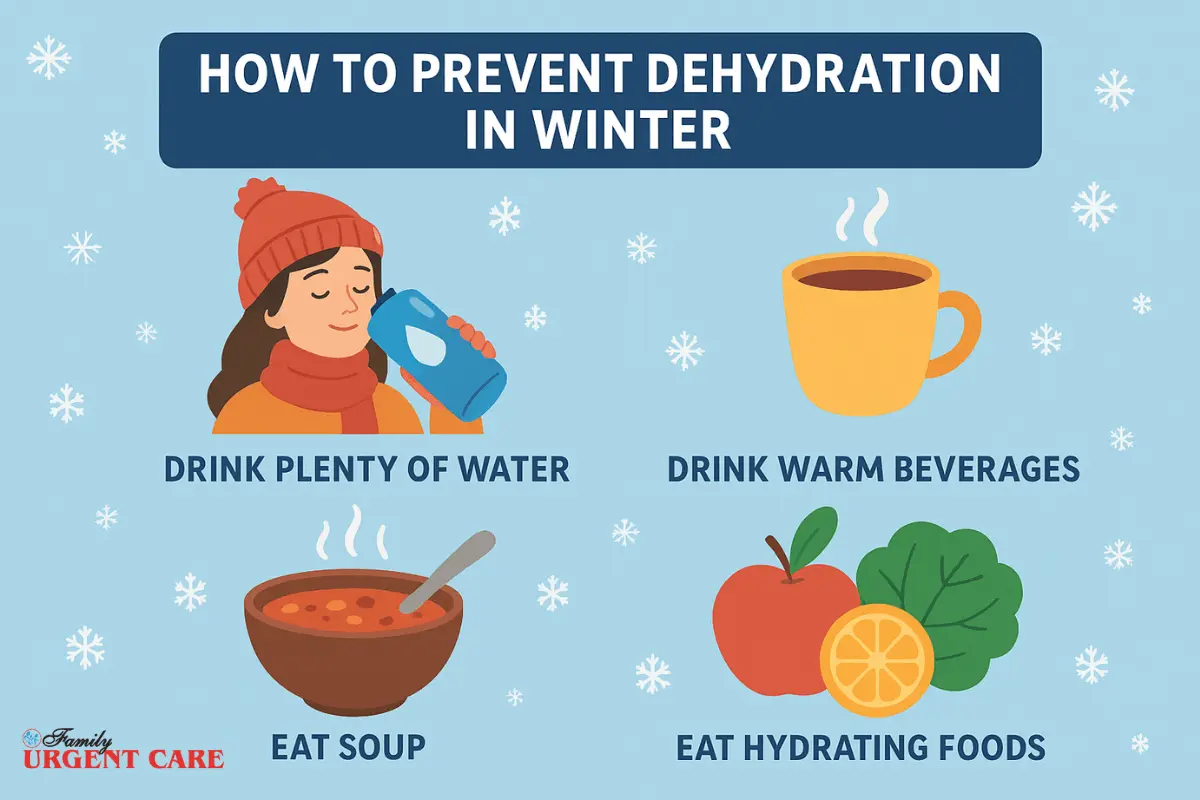As the cold weather sets in, it’s easy to think you don’t need as much water. After all, you’re not sweating buckets like in summer.
But your body still loses fluids through dry indoor air, wearing layers, and everyday activity. Drinking less during the shorter days of winter can leave you feeling tired, dizzy, and less focused on anything you do.
Therefore, it’s essential to keep yourself hydrated in cooler months. But sipping water isn’t enough. You have to adopt a few simple habits and smarter food choices to feel energized, stay healthy, and perform at your best.
In this article, we will explore common symptoms of dehydration during winter and discuss effective ways to prevent it.
Table of Contents
ToggleCommon Signs of Dehydration in Winters
Dehydration can affect you during the colder months, often without obvious signs like sweating. Watch out for these subtle cues that your body needs more fluids.
- Dry Mouth and Chapped Lips: Cold, dry air can sap moisture, leaving your mouth and lips feeling parched.
- Fatigue and Low Energy: Even mild dehydration can make you feel unusually tired or sluggish.
- Dizziness or Lightheadedness: Standing up quickly or moving around may cause faintness when fluid levels are low.
- Dark or Infrequent Urination: Less water intake and dry indoor air can reduce urine output or make it darker than usual.
- Headaches or Brain Fog: Dehydration affects circulation and oxygen flow, which can trigger headaches and reduce mental clarity.
- Dry Skin and Cracked Hands: Winter air and low hydration can make skin rough, itchy, or flaky.
Identifying these signs early helps you take action before dehydration affects your mood, focus, and overall health.
Proven Ways To Prevent Dehydration In Winters

Winter may feel cozy, but it can make your body lose water faster than you think.. Below are some easy and valuable tips to keep your body hydrated and thriving all season long.
1. Drink Enough Fluids
In winter, we often forget to drink enough water because we don’t feel as thirsty. But even in cold weather, your body still loses fluids through breathing, sweat, and indoor heating.
Hence, maintaining hydration levels is essential to prevent serious complications. While plain water is usually suggested, warm drinks like herbal teas, broths, or warm water with a splash of lemon can do wonders for your health. They not only replenish lost fluids but also help maintain body temperature, soothe dry throats, and support digestion.
Sipping these drinks throughout the day can keep your mood stable and your energy steady for longer.
2. Include Hydrating Foods
Hydration isn’t just about drinking fluids; what you eat matters too. Winter actually offers a wide variety of fruits and vegetables with high water content. They can help uptake fluids your body loses through dry air, layering or daily activities.
These include citrus fruits, cucumbers, zucchini, and leafy greens. They not only hydrate but also support your immune system, energy levels, and overall health. You can add both color and flavor to your plate by enjoying them in salads, smoothies, or warm soups and stews.
3. Limit Dehydrating Habits
Certain habits can quietly drain your body of water. That extra cup of coffee or a glass of wine might feel comforting, but they actually make you lose more fluids.
Caffeine and alcohol are mild diuretics, which means they increase urine output and speed up water loss from your body. Salty snacks and processed foods have the same effect, as high sodium levels draw water out of your cells. This leaves you feeling tired and sluggish without even realizing it.
Well, you don’t have to give up completely on your food choices. Just balance them with water, herbal teas, or warm broths, and your body will thank you. Small swaps like these keep your energy steady, your skin hydrated, and your body refreshed for longer.
4. Protect Skin and Moisture
Winter air is extremely dry, and indoor heating only makes it worse. Both can pull moisture from your skin and contribute to overall dehydration. Using moisturizers and oils helps lock in water, keeping your skin soft and healthy.
Similarly, a humidifier can also help by adding moisture to the air. It not only eases breathing but also keeps your skin healthy.
5. Monitor High-Risk Situations
People with symptoms like fever, vomiting, diarrhea, or chronic conditions like diabetes or kidney problems are especially vulnerable to dehydration. Young children, older adults, and individuals with weakened immune systems also require extra attention.
Keep an eye out for warning signs, such as very little urine, dizziness, extreme thirst, or a rapid heartbeat, in people. If these appear, it’s important to seek medical attention promptly. Catching dehydration early helps your body stay strong and maintain fluid levels before the condition worsens.
6. Opt For Healthy Electrolytes
Our body needs the right balance of electrolytes, especially in winter, to stay hydrated and energized. Minerals such as sodium, potassium, and magnesium help muscles function properly, maintain steady energy levels, and ensure the body absorbs fluids efficiently.
So, instead of relying on sugary sports drinks, choose natural options like coconut water, fruit juices, or oral rehydration solutions (ORS) for a quick electrolyte boost. You can also add electrolyte-rich foods, such as yogurt, nuts, and leafy greens, into your meals. These simple changes can keep you active and winter-ready.
7. Keep Your Exercise Intensity Low
Ever finished a winter workout feeling more exhausted than refreshed? That’s a sign you might be pushing your body too hard.
High-intensity workouts make you lose fluids faster through sweat and heavy breathing, even if you don’t feel it right away. Hence, it’s better to opt for light to moderate indoor exercises like walking, yoga, or stretching.
These help keep your blood flowing, your joints moving, and your energy up without depleting your body’s water too much.
Conclusion
Staying hydrated in winter takes a little more attention than in warmer months, but it doesn’t have to be complicated. By sipping fluids, consuming water-rich foods, and engaging in moderate activity, you can maintain healthy hydration levels. Taking small, consistent steps protects your body and builds resilience against seasonal challenges.
If you’re feeling severely dehydrated or your symptoms aren’t improving, visit Family Urgent Care. Our team will guide you with the right treatment and help you recover safely.
FAQs
1. How much water should I drink in winter?
Even in cold weather, adults generally need 2–3 liters of water daily, even if they don’t feel thirsty. Your exact needs can vary based on activity level, health status, and factors like indoor heating.
2. Can I get dehydrated even if I’m not thirsty?
Yes, winter reduces thirst cues, so it’s important to sip water and consume hydrating foods regularly.
3. Which foods help keep me hydrated in cold weather?
Soups, stews, fruits like oranges and berries, and vegetables such as cucumbers, zucchini, and leafy greens are great options.
4. Do warm drinks count toward hydration?
Absolutely. Herbal teas, broths, and warm water help restore fluids while keeping you warm and comfortable.


